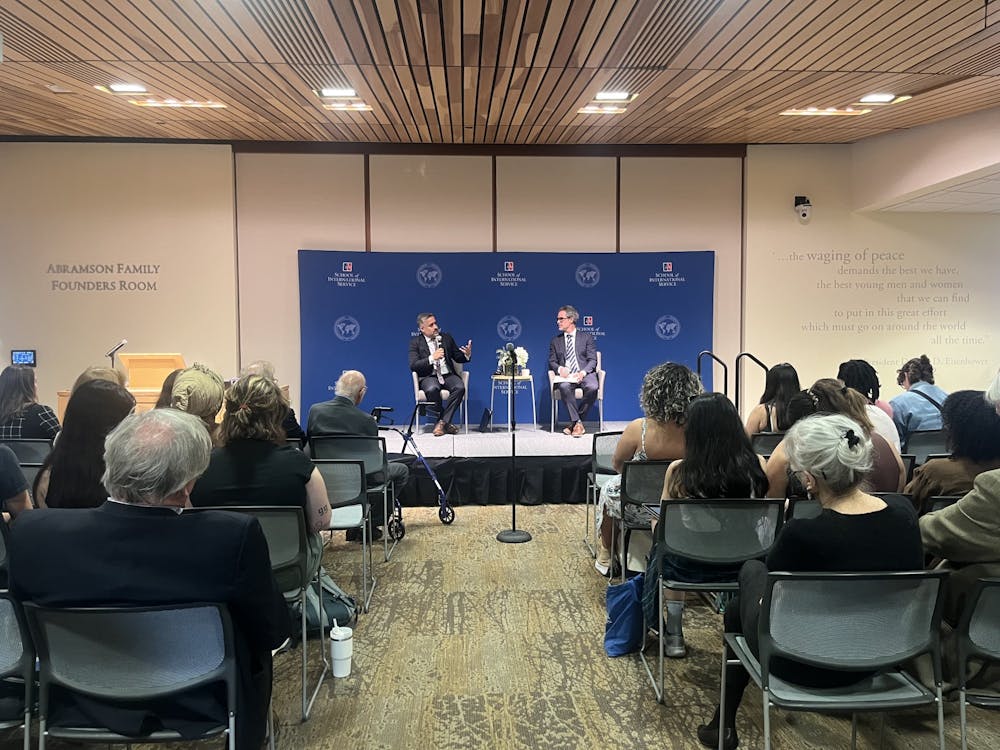Ramòn Cruz, president of the Sierra Club, aims to expand social justice initiatives in the environmental organization, according to a talk he gave in honor of Nancy Weiser Ignatius in the School of International Service on April 4.
The Sierra Club was not always inclusive to marginalized groups in the past, according to Cruz. Founded for wilderness exploration by John Muir in 1957, the club used to be invitation only. Cruz reckoned with the organization’s racist and exclusive past, which included pushing Indigenous peoples off their native lands.
“Before the great national parks, the lands belonged also to people that had been much better stewards than us and or anybody that came after them,” Cruz said.
Cruz said he received criticism for venturing outside the bounds of the environmental movement. He wants to include “voting rights, working rights, reproductive rights, labor rights and housing rights” in the organization’s work. These issues all intersect with the environmental movement, according to Cruz.
“I hope that Sierra Club supporters concerned about whether we focus on a narrow definition of environment can find a way to broaden our idea of the Sierra Club,” Cruz said.
Cruz is the first Puerto Rican and Latino president of the organization. When the organization was founded, his father and grandfather would have been excluded from participating in the organization.
“Things are very different today thanks in large part to people of color and white allies who fought to open the doors of these organizations to people like me, but it doesn't mean that there is no discrimination in the environmental movement,” Cruz said. “For many years, I was the darkest in the room with a cute Spanish accent.”
Now, the Sierra Club is taking steps towards environmental justice by adopting the principles of democratic organizing, according to Cruz. These principles include “Be Inclusive, Emphasis on Bottom-Up Organizing, Let People Speak for Themselves, Work Together In Solidarity and Mutuality, Build Just Relationships Among Ourselves and Commitment to Self-Transformation,” according to the Sierra Club website.
It takes more than reckoning with the past to change the future, according to Ariana Lippi, a first-year graduate student in SIS. Lippi volunteered with the Sierra Club in New York before starting her graduate program at AU.
When Lippi volunteered on the sustainable finance committee of the Sierra Club in New York, she found it difficult to create change and mobilize in the organization due to leadership and bureaucratic processes. Although Cruz pointed out the chapter has a new president, Lippi believes there is an “infrastructure problem” in the organization.
“I do think that there is so much that could be done to make it more inclusive,” said Lippi in an interview after the event. “I think environmentalism overall, the environmental movement in the U.S. is not inclusive towards people of color, trans people, just different identities and youth as well. There's a very white, old guard in that movement.”
Lippi wished the organization could improve its outreach since it is mostly volunteer based. There was a long application process she went through to become a volunteer. She thinks this process can be cut down or eliminated. Cruz said the organization now does student coalition training, but he recognizes that is not enough.
“I think it's the people and the old school organizing that can get us there,” Cruz said.
This article was edited by Patricia McGee, Kylie Bill and Nina Heller. Copy editing done by Isabelle Kravis and Stella Guzik.





